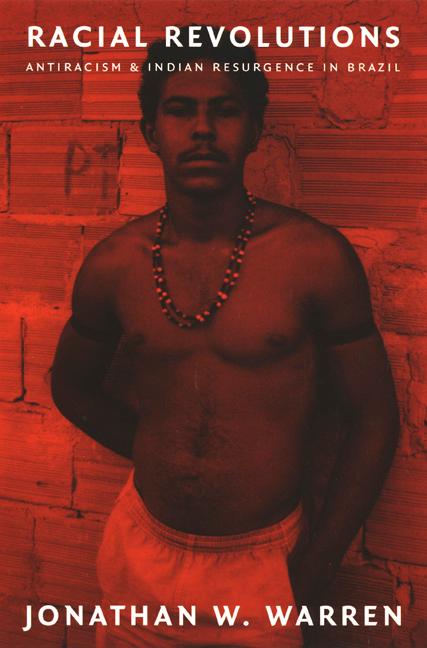
Zustellung: Do, 24.07. - Di, 29.07.
Versand in 3 Wochen
Versandkostenfrei""Racial Revolutions" is a deeply thoughtful and highly accessible analysis of contemporary racism. Jonathan Warren combines a highly developed research design, a powerful synthesis of crucial modern and postmodern theoretical frameworks, and a strong commitment to racial justice. This book will have important influence, not only on anthropology and studies of race, but on our understandings of indigenous cultures and movements, on our view of Brazil, and on our understanding of ourselves."--Howard Winant, author of "The World is a Ghetto: Race and Democracy since World War II"
Inhaltsverzeichnis
List of Illustrations
>Acknowledgments
>List of Abbreviations
Introduction: Maxakali Creation Story
1. Posttraditional Indians
>2. Methodological Reflections
>3. The State of Indian Exorcism
>4. Racial Stocks and Brazilian Bonds
>5. Prophetic Christianity, Indigenous Mobilization
>6. The Common Sense of Racial Formation
>7. Indian Judges
>8. Contesting White Supremacy
Epilogue>Appendix A: Questionnaire, 1995-1997
>Appendix B: Questionnaire, 1992-1994
>Appendix C: Biographical Data of Indian Interviewees
>Appendix D: Biographical Data of Non-Indian Interviewees
Notes
Glossary
Bibliography
Index
>Acknowledgments
>List of Abbreviations
Introduction: Maxakali Creation Story
1. Posttraditional Indians
>2. Methodological Reflections
>3. The State of Indian Exorcism
>4. Racial Stocks and Brazilian Bonds
>5. Prophetic Christianity, Indigenous Mobilization
>6. The Common Sense of Racial Formation
>7. Indian Judges
>8. Contesting White Supremacy
Epilogue>Appendix A: Questionnaire, 1995-1997
>Appendix B: Questionnaire, 1992-1994
>Appendix C: Biographical Data of Indian Interviewees
>Appendix D: Biographical Data of Non-Indian Interviewees
Notes
Glossary
Bibliography
Index
Produktdetails
Erscheinungsdatum
26. September 2001
Sprache
englisch
Seitenanzahl
392
Autor/Autorin
Jonathan W Warren
Verlag/Hersteller
Produktart
kartoniert
Gewicht
653 g
Größe (L/B/H)
234/157/28 mm
ISBN
9780822327417
Entdecken Sie mehr
Pressestimmen
"This is an original work that will be welcomed by all those interested in Brazil and in the Indian question in Latin America. Very well written, engaging, and successful in conveying the world and the voices of the actors, Racial Revolutions is indeed a pleasurable read." - Leon Zamosc, University of California, San Diego Racial Revolutions offers valuable lessons about 20th century indigenous populations in the Americas." - Cathy Marie Ouellette, E.I.A.L "[P]rovocative... [E]ngaging... Racial Revolutions provides valuable insight into a sector of Brazilian society that is too often ignored in scholarship on racial politics." - Tracy Devine Guzman, Bulletin of Latin American Research "Novel in its use of data and concepts, this book nicely bridges the anthropology of ethnicity, sociology of race, limits of liberation theology, and Brazilian history and culture. All levels and collections." - D. B. Heath, Choice "Jonathan Warren has written a provocative, no-holds-barred appeal to incorporate Brazil's eastern Indians into scholarship about race and antiracist activism... Racial Revolutions begins to fill a Brazilian void in the growing U.S.-produced anthropological literature about mixed-race peoples and their indigenous roots throughout Latin America... [A] stimulating book, well suited for undergraduate teaching about race and ethnicity in Latin America." - Jan Hoffman French, Hispanic American Historical Review "In Warren, scholars will have access to stirring testimonies of abuse, resistance, and identity formation." - Todd A. Diacon, Ethnohistory Warren details a nuanced process of an Indian resurgence and antiracism. This book is a must for those studying Brazilian racial issues. Furthermore, scholars of indigenous communities, social movements, and those interested in ethnogenesis and racial formation in general would find this book of interest." - Stanley R. Bailey, American Journal of Sociology "[I]ntriguing..." - Hal Langfur, The Americas "Jonathan W. Warren moves beyond an overly narrow, black and white conceptualization of Brazil's racial politics by broadening the scope of scholarly attention to consider the contemporary struggles of Brazil's self-identified Indians... Racial Revolutions illuminates an understudied domain of contemporary Brazilian racial politics, making an important contribution to the literature on race in Brazil and to the more general comparative literature in this field." - Mara Loveman, Contemporary Sociology "Warren challenges scholars of race, ethnicity, and identity to 'think outside the boxes' of their traditional scholarly paradigms... Warren breaks new ground... [A]n eloquent and thoughtful analysis ... This work will be of interest to activists and scholars of identity, ethnicity, and race in Latin America and elsewhere. It is an eloquent book that has potential political as well as scholarly implications." - Laura R. Graham, Journal of Anthropological Research "Since the 1970s, there has been a dramatic rise in the Indian population in Brazil as increasing numbers of pardos (individuals of mixed African, European, and indigenous decent) have chosen to identify themselves as Indian. This is the first book-length study of racial information in Brazil that centers on 'Indianness.'" - Hispanic Outlook in Higher Education "Warren's innovative study ... promises to stir further discussion on racial identity and inequality in Brazil and comparative indigenous mobilization in the Americas. - Seth Garfield, H-Net Reviews "[A] very informative, challenging, and stimulating book." - Linda Rabben, American Indian Culture and Research Journal "Racial Revolutions is a deeply thoughtful and highly accessible analysis of contemporary racism. Jonathan Warren combines a highly developed research design, a powerful synthesis of crucial modern and postmodern theoretical frameworks, and a strong commitment to racial justice. This book will have important influence, not only on anthropology and studies of race, but on our understandings of indigenous cultures and movements, on our view of Brazil, and on our understanding of ourselves." - Howard Winant, author of The World is a Ghetto: Race and Democracy since World War II
Bewertungen
0 Bewertungen
Es wurden noch keine Bewertungen abgegeben. Schreiben Sie die erste Bewertung zu "Racial Revolutions" und helfen Sie damit anderen bei der Kaufentscheidung.







